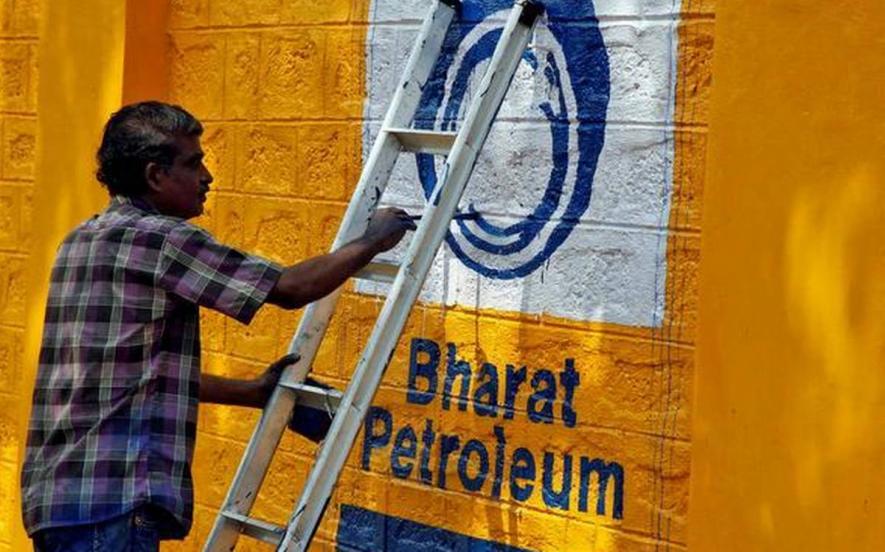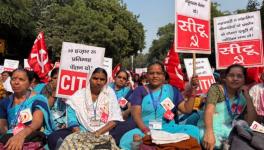BPCL: Striking Workmen Press for Settling Wage Issues Ahead of Privatisation

Representational Image. Image Courtesy: Reuters
Workmen of the state-owned Bharat Petroleum Corporation Limited (BPCL) staged a hunger strike at two refineries on Thursday, in what became a part of the spate of protests by public sector employees against the centre’s privatisation spree.
The workers’ protest was staged days after a Voluntary Retirement Scheme (VRS) was floated, which unions feared was anything but a “routine exercise” floated ahead of privatisation in a bid to trim the public company’s workforce.
As part of the strike, workmen at the Mumbai and Kochi refineries abstained from eating the entire day. As many as 3,000 workmen registered their opposition.
Normal operations remained unaffected at both the refineries, NewsClick was informed. Unions avoided public meetings or large gatherings, keeping the prevailing risks of a COVID-19 infection in mind.
The workers’ protested against the management for bringing in VRS before settling long- pending wage agreements of the BPCL workmen, said Aji M.G., general secretary, Cochin Refinery Workers’ Association (CRWA). “VRS was brought by the management without any consultations with union bodies. This is against the interests of the workers since wage negotiations – which include pending revisions over post-retirement benefits, are still ongoing,” he said.
The last wage agreement for the workmen at Mumbai refinery expired on December 2016; that for workers at Kochi refinery ended in 2018. Since then, the 10-year wage settlement have been pending at both refineries.
The VRS was brought by the management on July 23, enabling employees – both, executives and workmen – to voluntarily retire from their services to the company in exchange for compensation. All employees above 45 years of age can opt for voluntary retirement till August 13. The employees will remain eligible for post-retirement medical benefits and other repatriation expenses, the VRS circular said.
With a wage agreement yet to be finalised, the financial package one would receive post- retiring on voluntary terms is not clear to the employees, Aji told NewsClick.
What has added to the employees’ confusion is the looming spectre of privatisation over BPCL, which is the nation’s third-biggest oil refinery and second-largest fuel retailer. The centre currently owns 53.29% equity stake in the oil company which enjoys 22% of the country’s fuel market share with a market capitalisation of about Rs. 97, 247 crore.
Following the cabinet’s approval to sell government’s entire stake in the maharatna firm, expression of interests were invited in March this year. On Thursday, its deadline was extended for the third time; it is now September 30.
The Narendra Modi – led central government’s move was flayed by petroleum federations representing both officers and workmen and the central trade unions. It was criticised for handing out the oil sector – vital to nation’s energy security – to private players.
According to union bodies, the transfer of ownership will also cast repercussions over the working conditions of BPCL employees. They say the companies are looking at multiple cost cutting measures, including mass retrenchments.
There is fear among a large section of BPCL employees, who are uncertain about their future under a private management body, said Kishore Nair, general secretary, Bharat Petroleum Technical and Non-Technical Employees Association. “The impending privatisation is the main reason why we believe that VRS is not a routine exercise. It is offered to make the company more attractive for a sale and hence, we are protesting the move,” he explained on the phone from Mumbai.
The employees’ woes are compounded by the pending wage settlement issue, which the management is now in no hurry to solve, Nair alleged. The management has proposed 95% VDA merger and 12% fitment benefit for the workmen, which is lesser than what employees at other public sector undertakings have been offered. It is not even the same as what executives at BPCL have been offered – a deviation from traditional practices, he informed NewsClick.
However, there’s a catch. According to the draft memorandum of agreement (MoA) on wages and other matters, circulated to workmen unions at Kochi refinery in May this year and accessed by NewsClick, BPCL management asked the former to “take into account” the impending privatisation, while applying the principles of the wage agreement.
This translates to giving the right to the management to review the agreement, “as per the employment guarantee set out in the Sale Purchase Agreement,” to, “amend/modify/alter the terms and conditions agreed in this MOA,” based on various factors, as per the draft document.
“The management is already behaving like a private sector company,” Aji quipped. The workmen will intensify their agitation in the coming days in case wage negotiation does not reach its justified conclusion at the earliest, he added.
Alok Kumar Roy, President of the National Confederation of Officers Association (NCOA), an umbrella body of about 85 PSUs officers’ associations, told NewsClick that the officer’s association have always extended their “moral support” to the actions of the workmen in the oil and gas sector firms.
The recent agitations of the workers are completely understandable, given the history of manpower belonging to the lesser qualified categories usually the first to be trimmed post- privatisation, Roy said. “The thumb rule of it is that almost 70% to 80% of non-officers lose their jobs, as opposed to about 15% to 20% officers,” he said. However, he contended that this largely depends on the private company that takes up operations post-privatisation.
Asked if the officer’s union are also against the VRS, Roy replied in the affirmative. “We are principally also against the privatisation of any PSU, including BPCL,” he said.
However, Roy added that the fact that officers’ usually don’t directly engage in any industrial action despite their opposition is only because they are not protected under the labour laws. Hence, they fear management action against them, Roy added.
As per the Industrial Disputes Act of 1947, it only applies to ‘workmen’ – in legal parlance – which does not include people in a managerial role earning more than Rs 10,000 a month.
Public sector employees, including railways, banks and defence are gearing up for a tooth and nail fight against the centre, which has announced a privatisation bonanza under its ‘Atma Nirbhar Bharat’ package. Led by the ten central trade unions, employees and workers are set to strike work on August 9 to oppose the policies of the Narendra Modi government.
Get the latest reports & analysis with people's perspective on Protests, movements & deep analytical videos, discussions of the current affairs in your Telegram app. Subscribe to NewsClick's Telegram channel & get Real-Time updates on stories, as they get published on our website.
























